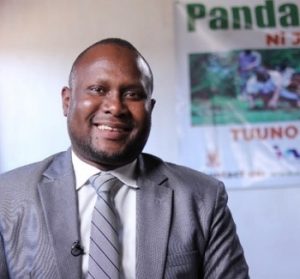The Fall of Icarus: Flying high with fake wings
30 May 2025
This blog originally appeared on the Nguzo Africa website.
The recent USAID foreign aid freeze reminds me of the mythical story of Daedalus and his son Icarus who flew high in the skies using wings made of wax and feathers. Ignoring his father’s warnings, Icarus flew too close to the sun and met a tragic end.

Elizaphan Ogechi, Nguzo Africa
The Daedalus and Icarus cautionary tale reminds us about painful tragic end of excess, hubris and disobedience. It fits the current state of falling development institutions built on fake wings of foreign aid.
To escape, Daedalus creates wings of feathers and wax for himself and Icarus, but he warns Icarus not to fly too close to the sun or the sea. Icarus disobeys his father’s warnings, flies too high, and the wax melts, causing him to fall into the sea and drown.
Just like Daedalus, to escape reality, development “experts” created funny development programmes and models with words like localization, sustainability and measurements, warning aid receiving organizations to take care. Unfortunately, the aid receiving organizations ignored “practical community advice” flying too high with fake well-funded programmes. A Trump heat hits. The foreign aid wax melts, causing massive fall and shutdowns of Icarus organizations, their staff, associates and partners.
I experienced a real-time Icarus moment ten years ago when the foreign funded programme I was working on came to an abrupt halt. I fell with a thud. Hit rock bottom. But fortunately, I got lifted by great change-makers in this journey / movement. A story for another day.
The Fall of Icarus organizations, 2025
Although there are no clear records of the number of organizations, staff and people affected by the foreign aid shutdown, what is clear is that the impact is heavy. There are reports that more than 60 global USAID offices have been shut down and the defunding of thousands of humanitarian projects — over 5,000 grants and contracts were canceled, in addition to mass layoffs of staff — creating a vacuum in development aid in regions historically dependent on international resources like sub-Saharan Africa, Latin America and Asia.
According to a survey conducted by CIVICUS, the most affected areas include health, civic engagement, human rights, humanitarian aid, well-being, economic development, education, legal advocacy, governance and gender equity.
In February 2025, Accountability Lab and Humentum began gathering data following the US government’s aid freeze. Initially, it was to inform the actions of partners and donors mobilizing resources, information and tools to try to assist organizations and people in need. The May 2025 results revealed the grave impact of this freeze. Respondents have shared that while organizations globally were affected by the cuts, programming is anticipated to be most affected in Kenya, Nigeria, the Democratic Republic of Congo, Uganda and Ghana. Nine of the top ten most affected are African countries, with El Salvador rounding out the top ten.
In terms of job losses, almost 55% of respondents reported having furloughed or laid off staff, with a further 14% confirming that layoffs were under consideration.
“This data is another stark indication of the challenges that the social sector is facing at this moment. These worrying trends were precipitated in many cases by US government aid cuts but are exacerbated by other donor aid cuts and larger critical issues such as closing civic space. It is imperative now that we find ways to collectively support each other and preserve the civic infrastructure we need to support inclusive, fair and open societies,” said Blair Glencorse, Co-CEO of Accountability Lab.
Are there parallels today?
The Icarus story presents us with an opportunity to reflect as sector change agents. We need to know where we went overboard with untamed egos of irrational exuberance, pride and experts in hotels and villages, eating the best meals, and driving sturdy SUVs amid persistent poverty. This story reminds us the importance of humility, of staying grounded, practical and responsive to community needs and aspirations.
“The story we see emerging from the data is that organizations must transform their structural models to build resilience, and collectively amplify those changes into shared, system-wide solutions,” said Chris Proulx, Co-CEO of Humentum.
There is need to invest in strengthening structural models of social good organizations to build strong, credible and thriving organizations that sustain their core mission despite funding uncertainties.
Are you learning and doing something?
I got encouraged by Graciela Hopstein, a 2024 / 2025 #ShiftThePower Fellow, whose commitment is to analyze the connection between democracy and community philanthropy (understood as a strategy for strengthening civil society, an agenda that becomes urgent and a priority in the current political and funding crisis we are experiencing).
She calls for the establishment of new global articulation spaces — understood as permanent debate forums involving global, regional and local civil society networks and international philanthropy, with the aim of designing alternative financing models that favour the autonomy of CSOs and collective impact. Second, she emphasizes the urgency of strengthening local funding and community philanthropy, including private social investment strategies.
We need to reimagine foreign aid and global development. Let us change our mind-sets and look at aid grants as social investments rooted in social-economic transformation. Let’s not shy from generating income and profits for social impact. Let us design and support programmes that have measurable social economic impact. These actions should be integrated with pressing issues of governance, policy and advocacy, human rights and gender considerations to create jobs, lift people out poverty and revive economies.
Way forward
Despite the missteps and Icarus falls, we are seeing a renewed focus within the sector to build viable community-driven organizations anchored on self-resilience, community service and doing good for impact.
- Approach the development sector from different mind-sets that emphasize humanity, empathy and service to people and planet. This must be told to new staff who are joining the social development sector: that the roads ahead are often murky and dirty but fulfilling for humanity.
- Encourage experimentation and learning on working social impact investments for wide scaling and replication. This will include designing policies that will catalyze the strengthening of local social impact organizations that can generate their own income while doing good for the people and the planet.
- Embrace local giving, community philanthropy and social enterprise investment.
- Create bold solutions to get us out of this mess. That means doing the hard work and heavy lifting to build sustainable funding models that fit the world we desire.
- Strengthen our networks, movements and platforms for solidarity, partnership and impact.
Conclusion
Let the Icarus story gives us a comeback to be more resilient, real and connected to building community power for active and thriving communities. Let us support initiatives, movements and platforms that seek to redefine social development funding, strategies and impact. Organizations are now renewing their strategies, models and focus to hit great heights like eagles, not fall like Icarus.
By: Elizaphan Ogechi, Executive Director, Nguzo Africa. Elizaphan was also a 2022 #ShiftThePower Fellow.


